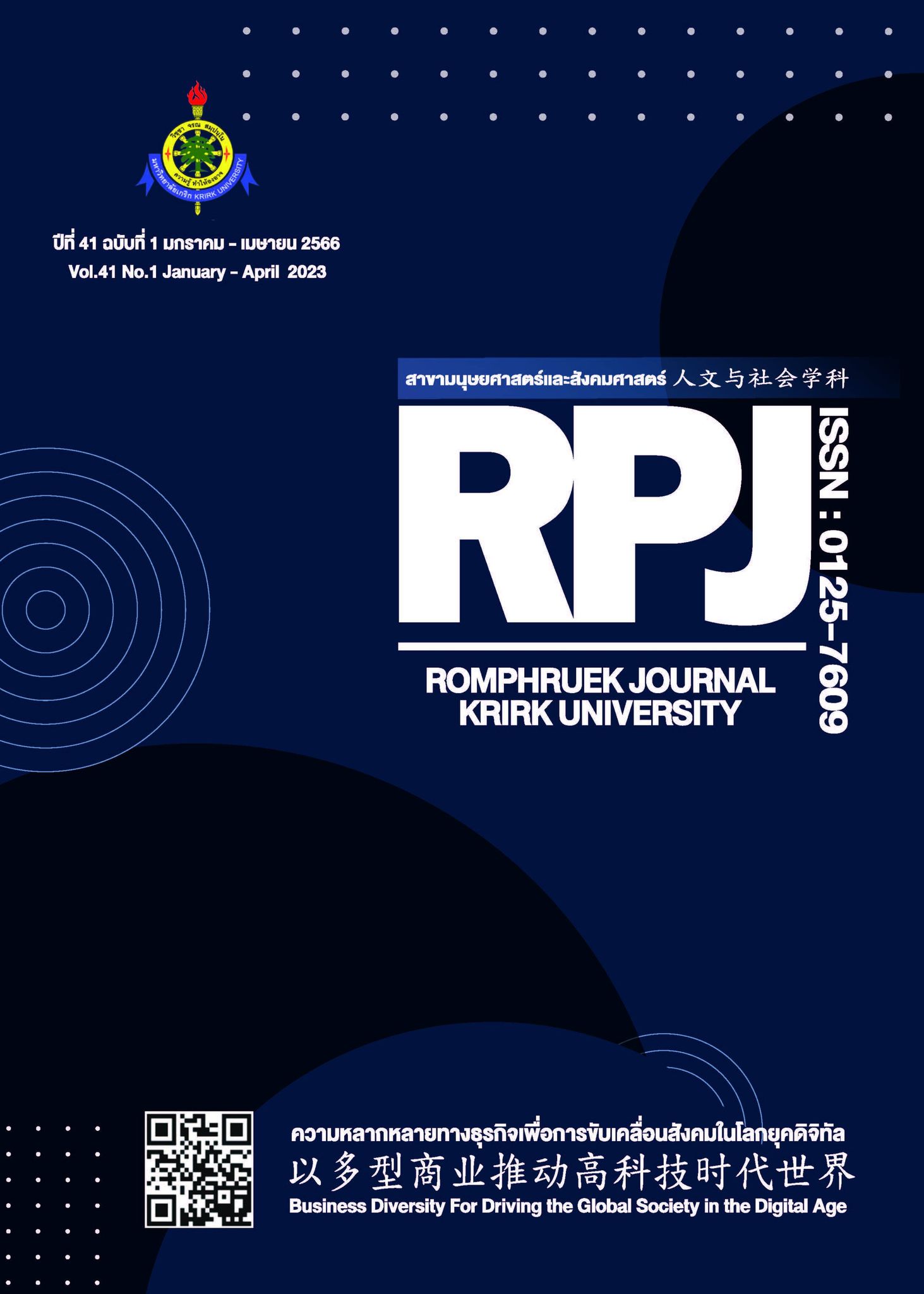The Effects of Cooking Activity Provision on Flexible Thinking Skill of Young Children
Main Article Content
Abstract
The objective of this research is to examine the flexible thinking skills of young children before and after they participate in cooking activities. The target group consisted of 16 boys and girls aged 5 to 6 years old studied in kindergarten level 3, second semester of the academic year 2021 at Wat Kok Cha La School, under the Office of the Private Education Commission. The research tools were twenty-four loose part play activities of four steps: step 1: creating interest; step 2: creating situation; step 3: activity operation, and step 4: report conclusion and behavior observation form of young children flexible thinking skills. The data was analyzed using mean, standard deviation, content analysis and descriptive narration.
The findings revealed that the children displayed more flexible thinking behavior after participating in the cooking activities than before the experiment. Furthermore, the results of the behavior observation showed that after participating in the cooking activity, the participants had better flexible thinking behavior in all aspects than before.
Article Details

This work is licensed under a Creative Commons Attribution-NonCommercial-NoDerivatives 4.0 International License.
Every article published in the Romphruek Journal of the Humanities and Social Sciences is the opinion and point of view of the authors. Thery're not the viewpoint of Krirk University or the editored department. Any part or all of the articles for pablication must be clearly cited.
References
จุฬินฑิพา นพคุณ. (2561). การพัฒนาทักษะสมองเพื่อชีวิตที่สำเร็จในศตวรรษที่ 21 สำหรับเด็กปฐมวัยผ่านการสอนแบบมอนเตสซอรี่. วารสารศึกษาศาสตร์ มหาวิทยาลัยศิลปากร, 16(1), 75-90.
ชัยวัฒน์ บวรวัฒนเศรษฐ์. (2559). ยุทธศาสตร์การจัดการเรียนการสอนตามทฤษฎีการเสริมต่อการเรียนรู้. วารสารวิชาการแพรวากาฬสินธุ์ มหาวิทยาลัยกาฬสินธุ์, 3(2), 154-179.
ณัฐพงศ์ วงวิวัฒน์. (2563). เสริมพัฒนาการให้แก่เด็กด้วยการเล่านิทาน. (12 พฤษภาคม 2564). สืบค้น
จาก https://www.childrenhospital.go.th/8836/.
ดารารัตน์ อุทัยพยัคฆ์. (2555). ประโยชน์ของการประกอบอาหารในเด็กปฐมวัย. (23 มีนาคม 2564). สืบค้นจาก http://daratim54.blogspot.com/2012/04/blog-post_08.html.
พลอยภัทรา จันทร์เด่นดวง. (2555). ผลการจัดประสบการณ์ประกอบอาหารที่มีต่อความสามารถด้านประสาทสัมผัสของเด็กปฐมวัย. สาขาการศึกษาปฐมวัย, มหาวิทยาลัยเกษตรศาสตร์. กรุงเทพฯ.
เทพกัญญา พรหมขัติแก้ว. (2554). ธรรมชาติการเรียนรู้ของเด็กปฐมวัยกับการเรียนรู้วิทยาศาสตร์ คณิตศาสตร์ และเทคโนโลยี. นิตยสาร สสวท, 40(174), 32-35.
ศรินยา ทรัพย์วารี. (2552). ผลการจัดกิจกรรมประกอบอาหารที่มีต่อพักษะพื้นฐานทางคณิตศาสตร์ของเด็กปฐมวัย. ปริญญาการศึกษามหาบัณฑิต มหาวิทยาลัยศรีนครินทรวิโรฒ. กรุงเทพฯ.
สุนิสา สีมาวงษ์ และชลาธิป สมาหิโต. (2562). ผลการจัดกิจกรรมประกอบอาหารที่มีต่อความคิดสร้างสรรค์ของเด็กปฐมวัย. วารสารบัณฑิตวิทยาลัย พิชญทรรศน์, 14(1),176-177.
สุภาวดี หาญเมธี. (2558). EFภูมิคุ้มกันชีวิตและป้องกันยาเสพติด.คู่มือสำหรับครูอนุบาล. (16 มีนาคม 2564). สืบค้นจาก https://www.facebook.com/RLGEF/?locale=th_TH.
Chatsathian, C., Misomsan, K., and Chaikan, A. (2017). wikrit pathommawai læ nǣothāng kǣkhai Early childhood crises and solutions. Bangkok: plus, press.
Claudia, C. M. (2016). Cooking together with young children. (May 13 ,2021) Retrieved from
www.bkc-od-media.vmhost.psu.edu/documents/HO_CookingTogether.pdf.
Dewey, J. (1969). Learning by doing. (July 27, 2021) Retrieved from
https://www.lingoace.com/th/learning-by-doing/.
Gioia, G. A., Isquith, P. K., Guy, S. C., and Kenworthy, L. (2000). Professional Manual Behavior Rating Inventory of Executive Function. Florida: PAR.
Jatisathien, C., Meesasan, K., and Chaikarn, A. (2017). Early childhood development. Bangkok : Plus, Press.
McCormack, T., and Atance, C.M. (2011). Planning in young children: A review and synthesis. Developmental Review, 31(1), 1–31.
Office of the Prime Minister. (2017). Twelfth National Economic and Social Development Plan 2017-2021. Bangkok: Office of the National Economic and Social Development Board.
Oh YH. (2002). The effect of integrated cooking activity onyoung children's creativity. Korea Journal of Child Care and Education, 31(0), 111-133.
Philosophy for Children New Zealand. (2020). About P4C. ( September 24, 2021) Retrieved from http://www.p4c.org. nz/about.


